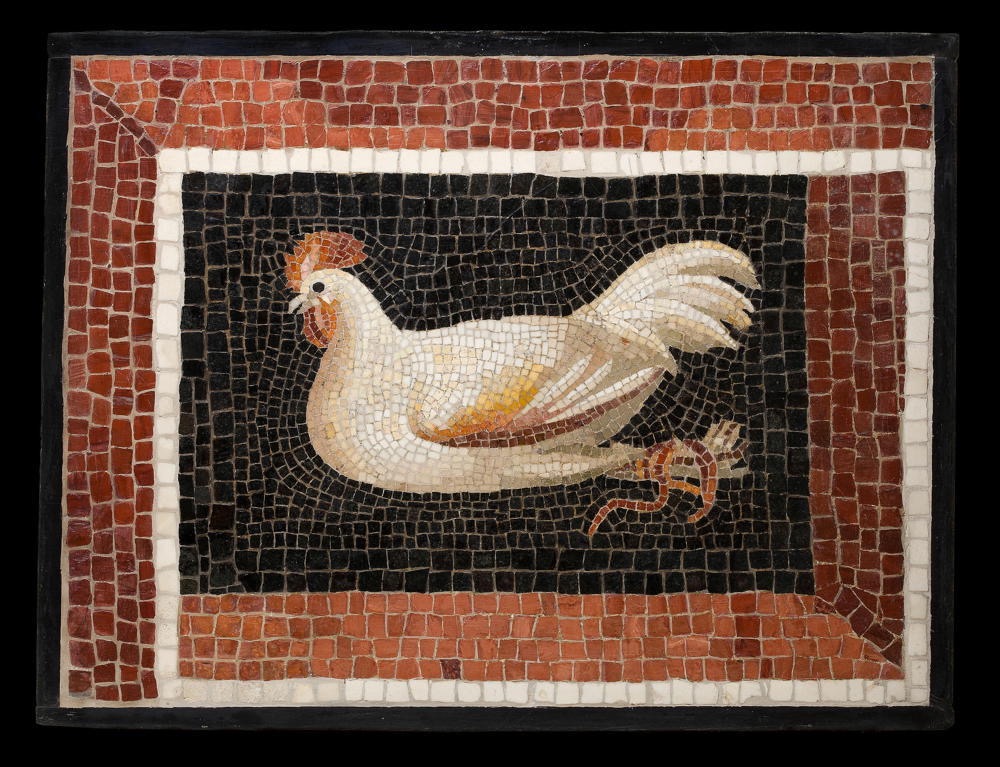BoundUp

Roman; Rome, Italy: Mosaic Floor Panel Depicting a Bound Rooster
(2nd century)
" … so I almost fervently imagine."
I cannot definitively declare anything about my paternal grandmother's family. Everything I ascertain seems based upon questionable scholarship, the result of seekers perhaps desperate to confirm their most craven convictions. Everyone secretly believes their family comes from royalty. Everyone imagines they're due some long-lost inheritance. Everyone imagines they come from noble characters, dukes, and dutchesses if not grand viziers. It sometimes even seems clear how to get there from here. Just log into Ancestor.com and follow the threads if you can. Nobody adequately imagines how much speculation went into those records and how little source documentation was ever discovered. Those who retain old family bibles might have the best documentation possible. Still, in the case of those immaculate births where the offspring seemed remarkably mature for a newborn, even the Good Book might contain fiction, if for all the very best reasons.
So, I try to take my discoveries with hefty spoonfuls of sand. I am not the man any historian might find heroic, and no number of prominent forebears could very likely change that judgment. I'm peering into dark and shadowy caves, probably mostly imagining what I perceive there. Still, I often feel a thrill when I experience even the illusion of discovery. Like yesterday, when I think I learned that we'd lost connection to where that Bounds thread originated because, about the time the first forebear immigrated, the family sometimes started spelling its surname differently. What became Bounds in the New World appears to have been Bond in the old. Since that emigration corresponds with the final months of the English Civil War, I easily imagine reasons for changing one's name, even for declaring a son an ‘I’ as if denoting a fresh beginning of the lineage. I've corroborated this discovery across two different sources, though I'd feel better if I could find a third. The Bond family history seems to nicely abut up against my seventh great-grandfather's birth as John Bounds, I, in 1649 in Northumberland County, Colonial Virginia.
He appears to have stayed there until the early 1660s, when he relocated to Tipiqueen Plantation in the freshly founded Somerset County, Maryland. Why shift from his birthplace in Virginia to Maryland? By 1660, the Virginia Colony had forbidden several religious practices, including Quaker and several Presbyterian variants, near the end of the English Civil War. In cahoots with the wiley Lord Baltimore, Wise Lord Calvert decided that if they welcomed those displaced worshippers to Catholic Maryland, the immigrants might blunt Dutch attempts to encroach on what the Lords considered their rightful but still unsettled possession. The ploy worked. Displaced worshippers flooded into Somerset County and successfully blunted the Dutch expansion. The Dutch would lose their North American possessions to the British fewer than forty years later.
John Bounds, 1, was the second child and first son of one Jonas Bond (SL). [If anyone can tell me, please, what the (SL) means, I promise to at least pretend appreciation, for my searching has yielded nothing.] I could trace this Bond family back to the thirteenth century, to one Gnu Le Bond, presumably another of those Norman nobles whose family was granted land by Charlemagne after Hastings, and so true British nobles. Gnu might have lived on the Isle of Wight, though his son, John Le Bond, appears to have been the lord of a place in Cornwall called Penryn. Those who watch the Doc Martin series on PBS might recognize this place as what was called in that series, "Portwen." I think they filmed the series in Penryn.
The family apparently cheerfully inhabited there and nearby Saltash and Erth Barton until the mid-fifteenth century, interrupted only by the occasional call to fight some war in France or respond to some other urgency from the monarchy. Several in the line carried the designation of Sir, which means they were considered knights of the realm. First sons doubtless still inhabit that Cornwell country but I come from the line of also-ran sons, though still regarded as minor nobility or perhaps prosperous merchants. I suspect Jonas Bond, my eighth great-grand, was a sea captain or traveling merchant. I can't imagine how, otherwise, his wife, Alice (Smart) Bond, could have bore ten children over fifteen years, with birthplaces ranging from Virginia, Massassachusets, and England, only to die in Virginia thirty-some years after bearing her last child and twenty-two years after Jonas died in London. I couldn't find the granularity to dissect the details beneath this data, so I had to project a bit.
The trip from Britain to Virginia in the 1650s was not necessarily a ride through anyone's park, with an average crossing time of about nine and a half weeks. Most declined the opportunity for a repeat performance. Ever. However, merchants and ship captains were in a traveling profession. It might have been that Alice chose to emigrate while her husband continued traveling. Whatever, if the records are correct, and they might not be provably in error, their story seems bizarre but not necessarily instantly discountable. It wasn't until thirteen generations after Gnu Bond lived, around 1250, that Jonas's son, the fourteenth generation, was born on this continent. I'm the twenty-third generation since, or so I almost fervently imagine.
©2024 by David A. Schmaltz - all rights reserved


